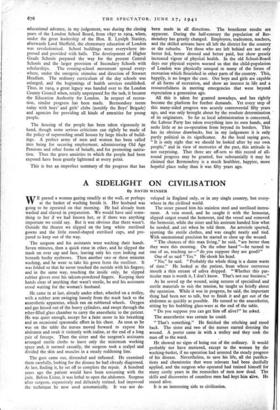A SIDELIGHT ON CIVILISATION
By DAVID WINSER
WE passed a woman gazing steadily at the wall, or perhaps at the basket of washing beside it. Her husband was going to be operated on that morning. He had already been washed and shaved in preparation. We would have said some- thing to her if we had known her, or if there was anything important we could say. But it was obvious that there wasn't. Outside the theatre we slipped on the long white sterilised gowns and the little round-shaped sterilised caps, and pre- pared to keep out of the way.
The surgeon and his assistants were washing their hands. Seven minutes, then a quick rinse in ether, and he slipped the mask on over cap and face, leaving only his eyes looking out beneath bushy eyebrows. Then another two or three minutes washing, and he went to take his gown from the steriliser. It was folded so that he never touched the outside with his fingers; and in the same way, touching the inside only, he slipped rubber gloves over his talcum-powdered fingers. Keeping their hands clear of anything that wasn't sterile, he and his assistants stood waiting for the woman's husband.
He came in at last, already under ether, wheeled on a trolley, with a rubber arm swinging loosely from the mask back to the anaesthetic apparatus, which ran on rubbered wheels. Oxygen and gas hissed out of the heavy cylinders, and swept through the ether-filled glass chamber to carry the anaesthetic to the patient. He was quiet enough, except for a faint snore in his breathing and an occasional spasmodic effort in his chest. As soon as he was on the table the nurses moved forward to expose his abdomen and swab it violently with iodine, at the end of a long pair of forceps. Then the sister and the surgeon's assistants arranged sterile cloths to leave only the minimum working space and, it seemed casually, the surgeon took a scalpel and divided the skin and muscles in a steady reddening line.
The guts came out, distended and inflamed. He examined them carefully, looking for the disease he had already diagnosed. At last, finding it, he set off to complete the repair. A hundred years ago the patient would have been screaming with the pain. Before Lister, it was lethal to open the abdomen. Surgeon after surgeon, expensively and delicately trained, had improved the technique he now used automatically. It was not de- veloped in England only, or in any single country, but every- where in the civilised world.
The sister passed him his stainless steel and sterilised instru- ment. A vein oozed, and he caught it with the hemostat, slipped catgut round the hemostat, tied the vessel and removed the hemostat, while the sister and his assistant handed him what he needed, and cut when he told them. An arteriole spurted, spotting the sterile clothes, and was caught neatly and tied. With unemotional precision he started to close up the wound.
" The chances of this man living," he said, " are better than they were this morning. On the other hand "—he turned to one of us, teaching us—" do you suppose they are good?"
One of us said " Yes." He shook his head.
" No," he said. " Probably the whole thing is a damn waste of time." He looked at the patient, from whose sterterous mouth a thin stream of saliva dripped. " Whether this par- ticular man is worth it, I don't know. That's not our business."
As he sewed up the wound, using sutures of specialised and sterile materials to suit the tension, he taught us briefly about the operation. While it was in progress, he said, the important thing had been not to talk, but to finish it and get out of the abdomen as quickly as possible. He turned to the anaesthetist, sitting by his bubbling glass-ware at the end of the table.
" Do you suppose you can get him off alive?" he asked.
The anaesthetist was certain he could.
" That's something." He finished the stitching and stood back. The sister and two of the nurses started dressing the wound. A porter came in with a trolley and they took the man off to the ward.
He showed no signs of being out of the ordinary. It would probably not have mattered, except to the woman by the washing-basket, if no operation had arrested the steady progress of his disease. Nevertheless, to save his life, all the purifica- tions and chemistries that were relevant had been dutifully applied, and the surgeon who operated had trained himself for many costly years in the researches of men now dead. The skills and discoveries of countless men had kept him alive. He stayed alive.
It is an interesting side to civilisation.






















 Previous page
Previous page